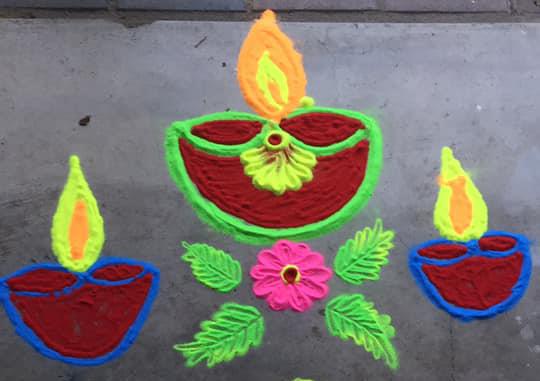Lockdown Diwali brings light to Wintec international students

Many Wintec international students celebrated Diwali at home this year. Chahat Jaiswal shares a photo of her rangoli patterns on the floor, a Diwali tradition for many who celebrate it. The rangoli represents the happiness, positivity and liveliness of a household, and is intended to welcome Lakshmi, the goddess of wealth and good luck.
Diwali, the festival of lights, is usually a celebration spent with family and friends. As one of the biggest and most beloved festivals celebrated in India, it’s a time where families drop sweets and gifts to friends’ houses, pray together, eat, and congregate to watch fireworks displays all evening.
For some of Wintec’s international students this year though, Diwali was spent in lockdown without their families, a starkly different experience for those that are used to the loud and colourful crowds the festival attracts.
For student Chahat Jaiswal however – rather than putting her off, it made her more determined to celebrate.
Jaiswal, who is in the final semester of a Postgraduate Diploma in Applied Information Technology at Wintec Centre for Information Technology, is from the Punjab area in North India. She has been living away from home for seven years, so is used to spending Diwali away from her family.
“Diwali has taken on a new meaning for many us students who have left our country,” she says.
“Indians are very family-oriented people – they celebrate these festivals with family. When you’re on your own, you don’t put too much effort into Diwali because it takes a lot of work. I avoided celebrating myself over the seven years since I’ve been away from home.”
This year though, a challenge was put to international students on their Facebook group page, asking students to send through photos and stories of how they were celebrating Diwali at home under lockdown. So Jaiswal and her flatmates called their families, found the components needed for pooja (prayer), bought sweets and food from the market, and celebrated together.
“As we get older it makes sense and gets a different meaning – we can understand why it means so much to our parents,” she says.
Girish Nair, International Director, who is also from India, echoes Jeswal’s sentiments, observing that not being able to celebrate with family is hard for many tauira/students.
“Diwali is what Christmas is to New Zealanders,” says Nair.
“Being away from family is not easy and especially in these challenging times it must be even harder for some as events like these are all about families coming together to spend quality time. Nevertheless, Diwali signifies victory over darkness and I hope that very soon families will be able reunite,” he finishes.

Jaiswal shares an image of her pooja (prayer) set up at home. She’s one of several Indian students who celebrated Diwali, the festival of light, from home this year.
Jaiswal and her flatmates each come from different religious backgrounds including Hinduism, Sikhism, and mixtures of the two. Because Diwali is celebrated across many different religions in India, Jaiswal says “it’s not just about staying connected to gods or religions, but staying connected with family and friends.”
“I come from a Hindu background so me and my flatmates did pooja with guidance from my parents over the phone. They said ‘it’s okay even if you mess it up because you did what you could’. It’s a good experience for me and my flatmates too – we're all from diverse religious backgrounds but we’re in a generation where we follow different religions half way through and combine different aspects – I've grown up with Sikhism, Hinduism and Christianity,” Jaiswal says.
After pooja, Jaiswal and her friends ate kheer, an Indian rice pudding, which comes from Jaiswal’s family tradition, and malpua, which are sweet pancakes coated in a sugary syrup.
Although Jaiswal and her friends celebrated in their own way, she says that “for a lot of students it might be their first or second Diwali away from home and they might not want to celebrate it alone.”
“When I first moved away I was happy to talk to my family over the phone and hear what they were doing but I didn’t want to celebrate it by myself. But it’s important to slowly start incorporating these things into what we’re doing now, dressing up, making food and spending time with friends.”
Bachelor of Nursing student Ann Mary Roni, who is from the Kerala region of India, has a slightly different take on Diwali.
Roni is from a Christian faith so Diwali is not part of her religious background. Diwali is still important to her and her community back home however, highlighting the importance not of the individual’s religion, but of the importance of community and friendship.
“At home, our neighbourhood celebrates Diwali so we would help them, share sweets with them and light their lamps,” she says.
“In our community we have Hindu, Muslim and Christian communities and we would come together, go to each other's homes, sharing and caring.”
Roni says that it’s all about “spreading light and positive energy and for good fortune in the following year.”
Like Roni, Jaiswal says Diwali has a message that applies not just to Indian cultures, but is something that has meaning for everyone.
“A lot of different cultures have different ways of celebrating, but the idea behind it is similar for everyone. It’s about light overpowering darkness, and welcoming that light into our life and our family. We hope that light and brightness makes our life brighter and helps us to move forward.”
Read more about studying as an international student at Wintec.

